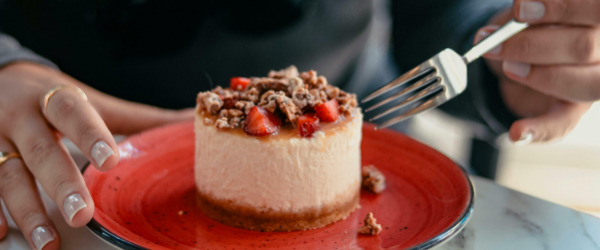By Adriana Ermter
In our monthly column, senior writer and editor Adriana Ermter shares her personal experiences with breast cancer
I call Tamoxifen hot flashes: bonfires with a flood. Because when one hits you, it feels like your entire body is going up in flames right before it’s soaked in a flood of hair-flattening, body-drenching sweat. It’s horrible and exhausting, never mind totally gross. And there was nothing I wouldn’t do to avoid having one. Even giving up sugar.
While I don’t have a big sweet tooth, as I’m more inclined to pick up a bag of chips than a chocolate bar, I also have zero self-control. Offer me freshly baked cookies and I’ll say yes while hoovering them in by the handful. Plunk a piece of pecan pie in front of me, even when I say I’m not hungry, and watch it disappear. Tell me you don’t love me anymore—like my husband did right before we separated—and witness me eating a pint of Häagen Dazs Cookie Dough ice cream (and my feelings) every single day for a year. Which I did.
How much sugar are you really eating?
I’m not an anomaly. According to a survey conducted by data-driven media and market research company Talker Research, the average American eats or drinks 99 grams of sugar a day, which equals about 80 pounds of sugar each year. I know this number sounds ridiculous, impossible to accomplish even, but it’s not and I’ll break it down.
Consider the glass of orange juice you drink at breakfast, the double-double Tim Hortons coffee you order, the hot sauce you brush onto your short ribs, the Ketchup you dip your fries into, the processed cheese you add to your hamburger, the one, two, three glasses of Sauvignon Blanc you “cheers” your Dad with at his birthday party … See what I mean? Every single one of these items is loaded with sugar. And this list could go on, mostly because of how much sugar is infused into everything we put into our mouths. Processed foods are loaded with it, including low-level suspects such as canned fruits and vegetables, cereal, bread, bacon, cured meats, ready-made meals, milk, yogurt and more—and they all contribute to our sugar consumption, according to data from the University of California, San Francisco’s SugarScience initiative. Given this high intake of the sweet stuff, researchers continue to examine whether there is a direct link between sugar and breast cancer.
Can sugar affect breast cancer cells?
One key area of research is the impact of sugar on cancer cell growth. Studies published by the National Library of Medicine and The University of Texas' MD Anderson Cancer Center state that cancer cells have the capability to consume glucose—sugar’s most basic form—at a faster rate than normal cells. This is linked to the “Warburg effect,” a phenomenon that describes how cancer cells gain energy primarily through glycolysis, a faster process than the one normal cells typically use. However, this doesn’t mean that eating sugar will directly feed your cancer. More research is needed to fully understand this connection, but it could potentially lead to new treatment approaches in the future.
As The Ottawa Cancer Foundation points out, every cell in our body needs sugar as fuel. While researchers continue to explore how sugar may directly impact cancer cell growth, there is a known indirect link: elevated weight increases the risk of cancer, and consuming foods high in added sugars can contribute to weight gain. This may explain why your oncologist may have advised you to limit your sugar intake. I know mine did. And when I listened and consciously cut back on how much ice cream I was actually eating, it truly did help decrease the intensity of and the number of Tamoxifen hot flashes I experienced.
Sugar and inflammation
That’s because sugar may contribute to low-grade inflammation in our body. As explained in an article published on health and wellness library Healthline, sugar, especially in the form of refined sugars and simple carbohydrates, triggers the release of insulin—a hormone that helps cells absorb glucose for energy. However, frequent sugar spikes and the resulting insulin surges can lead to insulin resistance, which is linked to chronic inflammation. Chronic inflammation could, in turn, damage cells and may create an environment that supports disease progression.
What you can do
For women like me, who are dealing with a breast cancer diagnosis, reducing or abstaining from added sugar can be a great way to go. You can start by reading the ingredient labels on packaged foods to help limit the amount of added sugar you’re ingesting to support your overall health. It may also help reduce inflammation, a good thing in general, as it can support a stronger immune response in your body. When your glucose intake is lowered, it can lead to improved insulin sensitivity, reduced inflammation and could lead to a more balanced hormonal environment—all factors that contribute to improved overall health. While the link between sugar and breast cancer continues to be studied, one thing is becoming clear: decreasing how much sugar you eat or drink may have significant health benefits. And that, in my opinion, is definitely worth cutting out the sweet stuff.
Adriana Ermter is a multi-award-winning writer and editor. Her work can be read in Sotheby’s Insight, Living Luxe and IN Magazine, as well as online at 29Secrets.com, RethinkBreastCancer.ca and AmongMen.com. The former Beauty Director for FASHION and former Editor-in-Chief for Salon Magazine, Childview and Figure Skater Fitness magazines lives in Toronto with her two very spoiled rescue cats, Murphy and Olive. You can follow Adriana on Instagram @AdrianaErmter







